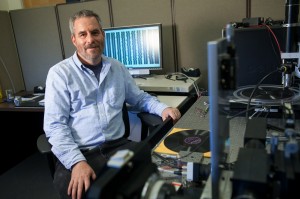A Berkeley Lab physicist who developed a way to digitally restore old audio recordings that are too fragile to play was named a MacArthur “genius” Fellow today (Wednesday, Sept. 25).
Carl Haber, a senior scientist in the Physics Division, is among 24 recipients to receive the prestigious award – $625,000 in unrestricted funds over the next five years – by the John D. and Catherine T. MacArthur Foundation. The MacArthur Foundation cited that Haber’s work “is poised to revolutionize the preservation of rare, damaged, and deteriorating sound recordings of immense value to our cultural heritage.”
Haber is the fourth Berkeley Lab scientist to be named a MacArthur Fellow.
His noninvasive optical sound recovery method has breathed new life into some of the earliest recordings ever made. It acquires high-resolution digital maps of the surface of audio media – such as wax cylinders, tinfoil recordings, and shellac discs – without touching them. It then applies image analysis methods to recover the data and reduce the noise of scratches and other damage.
The technology is derived from Haber’s work developing instrumentation and methods for detecting and measuring particles created at high energy colliders, such as the facility at CERN near Geneva, Switzerland.
A few years ago, Haber and Berkeley Lab colleagues, including Earl Cornell of the Engineering Division, set up this technology at the Library of Congress, where it’s used to digitally restore audio recordings that are too fragile to play.
Among their many milestones, they’ve helped to digitally recover a 128-year-old recording of Alexander Graham Bell’s voice, enabling people to hear the famed inventor speak for the first time. In 2012, they digitally restored an 1878 St. Louis Edison tinfoil, making it the oldest restored playable recording of an American voice. In 2008, they restored the oldest recording of a recognizable human voice, a “phonautograph” paper recording made in 1860 by French inventor Edouard-Leon Scott. And also in 2008, they salvaged an almost 100-year-old recording of famed writer Jack London’s voice.
Haber joined Berkeley Lab in 1985 after receiving a Ph.D. in physics from Columbia University.
Learn more about Haber’s sound reproduction research here.
Additional information about this year’s fellows, including bios, photos and video, are available at the MacArthur Foundation website.
# # #
Lawrence Berkeley National Laboratory addresses the world’s most urgent scientific challenges by advancing sustainable energy, protecting human health, creating new materials, and revealing the origin and fate of the universe. Founded in 1931, Berkeley Lab’s scientific expertise has been recognized with 13 Nobel prizes. The University of California manages Berkeley Lab for the U.S. Department of Energy’s Office of Science. For more, visit www.lbl.gov.
